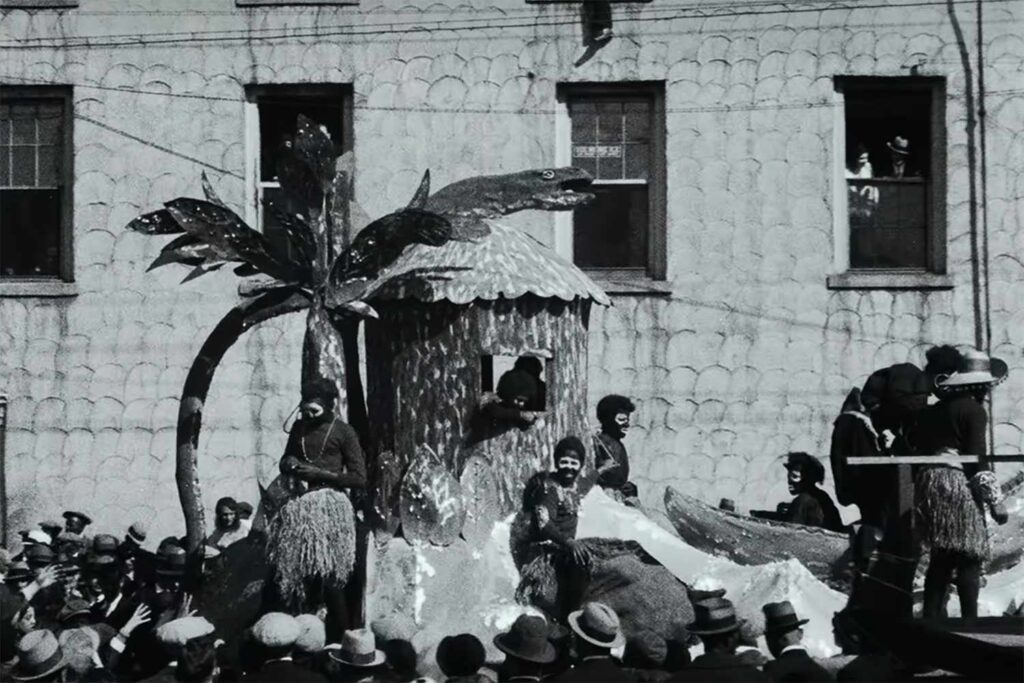NEED TO KNOW
In the early 1900s, the Black social group Zulu Social Aid and Pleasure Club began marching in Mardi Gras parades in New Orleans. However, due to the rampant racism of the time, the krewe was barred from wearing masks and went a creative route to participate in the festivities.
As explained in the new documentary A King Like Me, members of the group, which was founded in 1916, decided to wear face makeup that resembled blackface because Black men were legally prohibited from wearing masks.
The decision was jarring for some in the community. Barbara Rice, parent of Zulu member Terrance Rice, recalls being shocked by the makeup when she first attended a parade.
“The first time I went to Zulu, at that time, they were only allowed to be at the foot of the Canal Street ferry. And when I saw Zulu with all of that black stuff all over their faces, I cried. I couldn’t believe it,” Barbara says.
Netflix
When asked to elaborate, she says the makeup was “ugly” and reminded her of “how they imitated Black people.”
The traditional look used by the group consists of black makeup all over the face and white circles around the eyes.
The makeup carries grave significance for the group as Brian Sims, a former Zulu king, explains: “Back in the 1900s, the rules are, you have to mask. Every organization wears a mask during Mardi Gras. Back in those days, African American men could not legally wear a mask, so that’s how we came up with the blackface, the white eye and the white mouth. Some say that is a mockery, but that’s not what we are out here to do.”
“We’re here to represent our organization and mask,” he continues.
Never miss a story — sign up for PEOPLE’s free daily newsletter to stay up-to-date on the best of what PEOPLE has to offer, from celebrity news to compelling human-interest stories.
The documentary later reveals that members of Zulu and the wider community have conflicting views on the group’s use of makeup.
Radio DJ Chuck Perkins shares his reaction to seeing a photo of himself participating in a parade wearing blackface in a newspaper, saying, “Somehow in my own head, I was willing to live with the cognitive dissonance and say, ‘Look, because I know these guys, I know that’s not what they believe.’ ”
Erika Goldring/Getty
However, former Zulu king J. Herbert Banks brings the heated debate back to the historical origins of their Mardis Gras blackface.
“If we were allowed to wear masks like the White folks, we probably would’ve had on masks. But since we weren’t allowed to wear them, we wore what we were allowed to. And now, you’ve changed the game, well, I’m going to wear what I’ve been wearing,” he says.
At one point in the documentary, members of Zulu gather to discuss the makeup after receiving pushback.
On the opposing side, longtime member Kenya Rounds argues that the group has to be “mindful of what [the makeup] represents to the outside world and the community. I think the symbolism of it represents so much hatred, bigotry and racism, so people are offended by it.”
Netflix
He encourages the group to be open to reexamining their use of the blackface in the near future.
Elsewhere in the movie, Zulu Club President Elroy James insists that one’s opposition to the makeup does not diminish the good work the group does for New Orleans’ Black community.
“If you cannot fully embrace the makeup requirement, don’t let your position be that the organization is not upholding the community because so much of what we do throughout the year counters that,” he says.
A King Like Me, directed by Matthew O. Henderson, explores both sides of the loaded discussion while following Zulu members “as they work to bring the Zulu parade back to the streets for Mardi Gras Day 2022, in the face of a global pandemic, Hurricane Ida and the loss of members due to COVID and gun violence.”
It also addresses, in depth, how the social group was affected by the COVID-19 pandemic, which led to a loss of 15 members, according to the film.
The documentary marks Henderson’s feature directorial debut and is produced, in part, by Fisher Stevens, Kevin Hart and Robin Roberts.
A King Like Me is currently streaming on Netflix.

